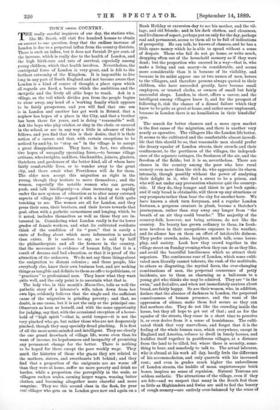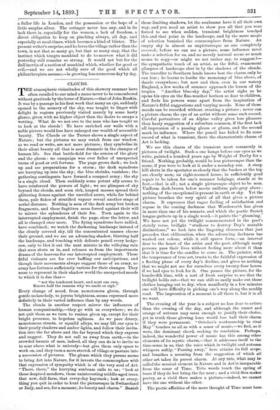TOWN versus COUNTRY.
THE really careful inquirers of our day, the statists who, like Mr. Booth, will visit five hundred houses to obtain an answer to one question, deny that the endless increase of London is due to a perpetual influx from the country districts. There is such an influx, but it does not furnish 20 per cent, of the increase, which is really due to the health of London, and the high birth-rate and rate of survival, especially among
young children, which that health involves. Nevertheless, the centripetal force of London is very great, and is felt to the young children, which that health involves. Nevertheless, the centripetal force of London is very great, and is felt to the farthest extremity of the Kingdom. It is impossible to live long in any part of South England and not become aware that London is a kind of centre of thought, a place upon which all regards are fixed, a bourne which the ambitious and the energetic and the lively all alike hope to reach. Ask in a village, as the veil which divides you from the people begins to clear away, any head of a *working family which appears to be fairly prosperous, and you will find that one son is in London and another has got work in Bristol, that a nephew has hopes of a place in the City, and that a brother has been there for years, and is doing " reasonable" well. Ask the boys who play cricket, or sing in the choir, or succeed in the school, or are in any way a little in advance of their fellows, and you find that this is their desire, that it is their notion of a career, and that, with certain exceptions to be noticed by-and-by, to "stop on" in the village is to accept a great disappointment. They have, in fact, two alterna- tive hopes of unequally operating force,—to become village artisans, wheelwrights, saddlers, blacksmiths, joiners, glaziers, thatchers, and gardeners of the better kind, all of whom have fairly comfortable lives, or to wander away to the great city, and there await what Providence will do for them. The elder men accept this migration as right in the young, though they hesitate to move themselves ; and the women, especially the notable women who can govern, push, and talk intelligently—a class increasing so rapidly under the new system of education as to alter many outward aspects of village life—regard it with a kind of faith quite touching to see. The women are all for London, and they press their sons, their brothers, and their lovers towards that goal, often with a pathetic earnestness and longing, which, be it noted, includes themselves as well as those they are in- terested in. Considering what London really is for its lower grades of female workers, and what its cultivated residents think of the condition of its " poor," that is surely a state of feeling about which more information is needed than exists. It is useless to say, as is said by half the philanthropists and all the farmers in the country, that the movement is evidence of human folly, that it is a result of dreams and bad education, or that it is proof of the attraction of the unknown. We do not say those things about the emigration to distant colonies ; and these people, like everybody else, know their own business best, and are seeking things as tangible and definite to them as office to politicians, or " practices " to professional men. They know what they want quite well, and the only point is to ascertain what that is.
The lady who, in this month's Macmillan, tells so well the pathetic story of a labourer's wife, taken down from her own lips, evidently believes that the single and the sufficient cause of the migration is grinding poverty; and that, no doubt, is one cause, but it is not the only or the principal one. Observers as keen as herself, and with the same opportunity for judging, say that, with the occasional exception of a house- hold of " high spirit "—that is, acrid temper—it is not the very pinched who go, but rather those who are not desperately pinched, though they may specially dread pinching. It is first of all the more acute-minded and intelligent. They see clearly the one grand drawback of village life, worse even than its want of income, its hopelessness and incapacity of promising any permanent change for the better. There is nothing to be hoped for there except the poor weekly wage. They mark the histories of those who gop as they are related to the mothers, sisters, and sweethearts left behind; and they find that a proportion of the emigrants are .no worse off than they were at home, suffer no more poverty and drink no harder, while a proportion rise perceptibly in the scale, as villagers reckon scales, earning larger wages, wearing better clothes, and becoming altogether more cheerful and more sanguine. They see this second class in the flesh, for your real villager who gets on in London goes now and again on a Bank Holiday or excursion-day to sec his mother, and the
vil-
lage, and old friends ; and in his dark clothes, and cleanness, and liveliness of aspect, perhaps put on only for the day, perhaps real and permanent, seems to them all to be full of indications of prosperity. He can talk, he knows of chances, and he has a little spare money which he is able to spend without a sense of despair. Those who fail do not go home, or write much, dropping often out of the household memory as if they were dead; but the proportion who succeed in a way—that is, who make a living and can marry—is considerable, and seems more considerable than it is because of its visibility, and because in its midst appear one or two names of men, heroes to the villagers, and therefore persons always quoted to their children, who have succeeded greatly, have become small employers, or trusted clerks, or owners of small but fairly successful shops. London, in short, offers a career, and the intelligent among villagers know it, and for the prospect of following it, risk the chance of a dismal failure which they know to be quite as great at home, and rather more unpleasant, because in London there is no humiliation in their kinsfolke' eyes.
The search for better chances and a more open market is the first cause of the migration, and there is another very nearly as operative. The villagers like the London life better. It seems to the cultivated and the comfortable almost incredi- ble that this should be so, that reasonable men should prefer the dreary squalor of London streets, their crowds and their confinement, to the prettiness of the villages, the independ- ence of the separate cottages, the freshness of the air, and the freedom of the fields ; but it is so, nevertheless. There are classes in the country among the poor who love rural scenery even more than the rich do, who appreciate its charm intensely, though possibly without the power of analysing their delight in it, who feel a street to be a prison, and who will not under any provocation whatever quit the country- side. If they do, they hunger and thirst to get back again; and if only bread is obtainable, will throw up any situations or any prospects rather than bear the city for another hour. We have known a clerk turn ferryman, and a regular London footman, a gorgeous creature in plush, become a thatcher's journeyman, rather than stay away any longer from "the breath of an air they could breathe." The majority of the country-folk, however, not being artisans, do not like the country. Its beauty has grown ordinary to them, its fresh- ness involves in their occupations exposure to the weather, and its silence has on them an effect of intolerable dulness. They prefer crowds, noise, laughter, much talk; some horse- play, and society. Look how they crowd together in the village street on Sunday evening,when they can do as they like, and avoid the beautiful lonelinesses which so attract their superiors. The continuous roar of London, which some culti- vated men literally cannot tolerate, the rush of the multitude, to others so disgusting, the myriad faces, the ever-changing combinations of men, the perpetual occurrence of petty incidents, are to them as charming as a ball-room to a young girl who thinks she may be admired. They are " in the swim," and feel alive, and when not immediately anxious about bread, are fairly happy. So are their women, who, in addition, declare that the absence of darkness in London, the perpetual consciousness of human presence, and the want of the oppression of silence, make them feel secure as they can feel nowhere else. They do not like the crowding inside the house, but they all hope to get out of that ; and as for the squalor of the streets, they cease in a short time to perceive it, or even derive from it a sense of homishness. The culti- vated think that very marvellous, and forget that it is the feeling of the whole human race, which everywhere, except in England and America, refuses to dwell in lonely houses, and huddles itself together in pestiferous villages, at a distance from the land to be tilled, but where there is security, some- thing to hear, and somebody to talk to. The actual labourer, who is abroad at his work all day, hardly feels the difference of his accommodation, and only quarrels with his increased rent; and even in grades much higher the tualoveliness of London streets, the huddle of mean unpicturesque brick boxes, inspires no sense of repulsion. Natural Teutons are seldom aesthetic. The attractions of the village, even if they are felt—and we suspect that many in the South feel them as little as Highlanders and Swiss are said to feel the beauty of rough scenery—are entirely over-balanced by the sense of a fuller life in London, and the possession or the hope of a little surplus silver. The cottager never has any, and in its lack there is, especially for the women, a lack of freedom, a direct obligation to keep on pinching always, all day, and especially at meal-times, which becomes a kind of blister. The present writer's surprise, and he loves the village rather than the town, is not that so many go, but that so many stay, that the instinct which tempts mankind to do to-morrow what it did yesterday still remains so strong. It would not but for the dull inertia of a section of mankind which, whether for good or evil,—and we are not wholly sure of the good which all philanthropists assume,—is growing less numerous day by day.



































 Previous page
Previous page